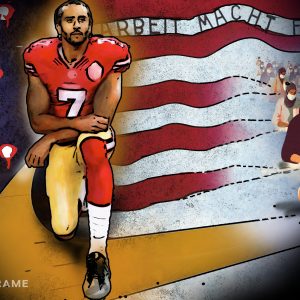Marcus Rashford’s greatest goal
The Manchester United striker netted a far more memorable goal than those scored on the pitch when he used his voice and influence to keep vulnerable children fed during the Covid-19 pandemic.
Author:
20 January 2021

Before kickoff in Manchester United’s 3-1 English Premier League win over Everton on 7 November 2020, the giant screen at Goodison Park flashed a special message for a player whose influence extends significantly beyond 90-minute intervals.
“Thank you for sticking up for our kids who needed a voice, here on Merseyside and across the country.” – The Everton Fans’ Forum.
Next to that message was a picture of United and England striker Marcus Rashford. Even in the most unusual year in living memory, the gesture from one rival to another was startling – at least until you understand the full story. It is a story that also informs the three letters that now appear at the end of Rashford’s name: MBE.
Member of the Most Excellent Order of the British Empire. The Queen of England bestowed the honour on Rashford in October 2020 for services to vulnerable children. His considerable and consistent voice pressured the British government into a U-turn on its decision to end the meal voucher scheme for schoolchildren, especially after his powerful letter of appeal was shared widely on social media.
The 23-year-old successfully campaigned for vulnerable children across the United Kingdom to receive their school meal vouchers even during holidays, especially with learning institutions heavily affected by the Covid-19 pandemic.
Related article:
With a social media following that reaches beyond 10 million across various platforms, Rashford joined a campaign that had been sparked by a petition by a teenager in Brixton, London, who urged Prime Minister Boris Johnson not to abandon her and the 1.3 million children around the UK who were eligible for free school meals.
Everton – who call themselves the blue half of Merseyside, Liverpool being the red half – are the football club of choice for thousands upon thousands of vulnerable children, and there are certainly corners of the region that are far more intimidating than any Merseyside derby tackle.
Troubled road to the Theatre of Dreams
Rashford’s rallying call, then, touched them on a deeply personal level. He knows only too well the importance of that lunch meal at school, having grown up in Wythenshawe in south Manchester. It was once the largest council estate in Europe, with nine districts.
Wythenshawe is eight miles from Old Trafford, the famous Theatre of Dreams. That represents a mere 15 minutes of driving but, in reality, the road Rashford had to take from that council estate to the highest levels of sport was potholed with social peril and the lingering threat of poverty.
It is a narrative familiar the world over, that merging of lanes, where upbringings of moderation and affluence suddenly converge. En route, young men and women have a choice to make. From a young age, the precocious Rashford’s mind was made up. He was going to be the one putting food on the table, to repay a rash of family sacrifices. And then some.
“My mum was a single parent, with five kids to feed. The stress of putting food on the table really affected her,” he told the BBC in June. Rashford added that it was not until two of his elder siblings moved out that his mother started living anything resembling a normal life, doing everyday things like visiting friends. Until then, she literally worked and slept, doing all she could to put food on the table, he recalled in the touching television interview.
“I was on free meals. My mum wouldn’t get home until 6pm. So my next meal [after the free lunch meal] would only be 8pm. I was fortunate, because there are some kids who didn’t have that,” he said soberly.
He was the youngest in the family, but Rashford didn’t take too long to realise that his gift of football could take him and his family out of Wythenshawe and into the neighbouring borough of Cheshire, where the ballers dwell.
Related article:
From Merseyside, 45 minutes down the road, he already had a gleaming example of how quickly and completely life could change through football. By the time Rashford was helping himself to Sunday league hat-tricks, Wayne Rooney was an international superstar, having swapped Everton blue for Manchester red. His feet had kicked him out of the skirmishes of Croxteth, Merseyside, and into the big time.
At the height – or depth – of their despair, Croxteth and Wythenshawe were comparable to any favela or township in terms of the lack of social choices for impressionable young residents. They were rough and tough neighbourhoods and, in those circumstances, a life of crime and easy money can seem a lot more attractive than putting your head down and working towards a dream.
The power of sport
Sport, of course, can change lives, now more than ever. It is fitting that Manchester United’s stadium has its dreamy nickname. It is eerily similar to many of the great football theatres around the world, a shimmering monument of steel, and glass, and grass, often surrounded by neighbourhoods that hear the songs and shouts every other Saturday but can’t really afford to pay the entrance fee to go and see the spectacle for themselves. It is but a dream.
The Maracana Stadium in Rio. The FNB Stadium in Soweto. The new Wembley Stadium. Anfield. These world-famous cathedrals of the beautiful game all have the common trait of being well-heeled residents in neighbourhoods of genuine strife. But they serve that other purpose of inspiring fertile young minds.
Raheem Sterling could see the Wembley arch as a small boy, and every school-yard goal he scored was laced with the lingering hope of one day doing it for real, beneath that arch.
Sport inspires. Truly.
In the modern era of social media and reach, sport also has the ability to influence many more lives than ever before. Rashford knew that, as do others. It is too easy to post images of latest cars and watches, the perennial champagne campaign.
That flash only reiterates the chasm between privileged and impoverished, and reinforces the stereotype of sportsmen and women who live outside of reality. Refreshingly, Rashford is using his reach for greater good. He is on a feeding campaign.
He has got the attention of the most powerful individuals in the UK. When the campaign first came to his attention, Johnson reached out to Rashford. That alone represents a seismic change, and emphasises the power of social media when used for good.
Related article:
“I called him and congratulated him. I thanked him for what he has done,” Johnson told Parliament ahead of the British summer holidays. “I think he is right to draw attention to this issue. I do think it is right that we should be looking after families of the most vulnerable and that is why we have the Covid-19 Summer Food Plan, and I hope it will make a big difference to those kids and to those families.”
On receiving news that he would be awarded an MBE, a bashful Rashford refused to prematurely blow the final whistle on the highly publicised campaign. “I would be doing my community, and the families that I have met and spoken with, an injustice if I didn’t use this opportunity to respectfully urge the prime minister to support our children during the October half-term with an extension of the voucher scheme, as the furlough scheme comes to an end and we face increased unemployment.”
The realities brought about by the Covid-19 pandemic have been a sobering dose of perspective. In truth, the majority of the world has had to endure such challenges most of their lives. Now they are simply doing it wearing a mask. The struggle has been real and it has been around for a long, long time.
Related article:
“It is very difficult to find a way out. Now that I am in this position, it is very important that I help the people that are struggling. That was the main reason the letter was written.”
The example set by Rashford has received wide praise, and also support from the football industry. British football’s most successful manager, Alex Ferguson, has spoken of his admiration for what Rashford is doing at just 23.
But, more than just acknowledging the striker’s efforts, Ferguson pledged to put his money where mouths most need it, through the London Times and Sunday Times Christmas Appeal, alongside his billionaire philanthropist friend Michael Moritz.
The Times’ donations for 2020 were going to three charities including Fareshare, a food charity that takes thousands of tonnes that would have been waste and is turned into meals for more than 11 000 local groups and charities. Ferguson and Moritz doubled the £2-million donations to the food charity.
At the heart of this, Rashford is simply following the example set by his mother. When he started showing potential in football, she pushed hard to get her then 11-year-old son fast-tracked into a training and accommodation programme that normally starts at the age of 12. It was closer to training, put him in a new school and, most importantly, gave young Rashford the nutrition he needed to give him the best chance at becoming a professional footballer.
There is a common thread of sacrifice in many footballing success stories. Sterling’s sister used to accompany him on three buses to get to Queens Park Rangers youth training after school. She essentially gave up her social life to give her brother the support he needed as he stepped into a world of promise and pain.
Similarly, for Rashford’s mother, there was a terrific sacrifice. But it paid off handsomely and she has raised a young man who is conscious of the privileged position he has earned, and is now using that pedestal to mobilise change for others.
He has formed a child food poverty task force, and called on some of the biggest food suppliers and supermarkets in the UK for their support. This is not a passing trend. It is a movement. Rashford is in the business of changing lives, and changed his name in the process.
“I feel honoured to have that title. Hopefully it inspires more people to do good things. This is a very special moment for myself and my family, but particularly my mum, who is the real deserving recipient of the honour,” he said poignantly.
“Let’s stand together in saying that no children in the UK should be going to bed hungry. As I have said many times before, no matter your feeling or opinion, not having access to food is never the child’s fault.”




